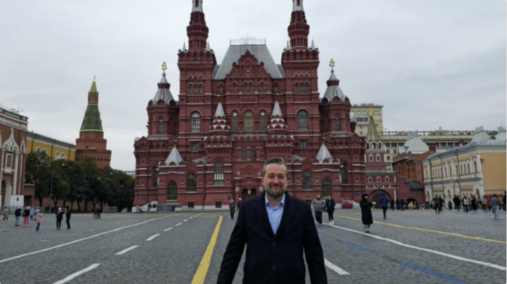Ľuboš Blaha, vice-chairman of Robert Fico’s SMER party and a Member of the European Parliament uses his privileged access to Kremlin elites to push pro-Russian propaganda, blatantly contradicting the government’s claimed foreign policy balance. While SMER postures as pro-European abroad, Blaha’s rhetoric at home exposes a dangerous allegiance to Kremlin’s agenda weakening trust of allies and partners.
Blaha opened his video posted on Telegram by mocking critics of his meeting with Dmitry Medvedev: “Liberal media are outraged that I met with the former President of the Russian Federation Dmitry Medvedev. … Understanding Dmitry Medvedev’s views is extremely important, which is why I will share our conversation with you.” By positioning Medvedev—a key architect of Russia’s military aggression against Ukraine—as a legitimate and credible voice, Blaha ignores his role in justifying war and overseeing human rights abuses.
Presenting himself as a bridge between Slovakia and Russia, Blaha claimed: “Without understanding the positions of the Russian side, peace cannot be achieved.” As one of the first Slovak politicians to parrot Kremlin propaganda as early as 2017-2018, he is now granted access to the highest figures in the Kremlin to legitimize Russian military aggression against Ukraine in Slovakia and the European Parliament.
Perhaps the most shocking part of Blaha’s speech was his reference to Medvedev’s comments on Slovak Prime Minister Robert Fico: “He specifically addressed the assassination attempt on our Prime Minister Robert Fico. According to him, trying to kill someone simply for having a different opinion is an unimaginable disgrace for European democracy. It is a disgrace unparalleled in history.”
This grotesque statement, portraying Medvedev as a defender of democracy, is deeply cynical given his position as one of the Kremlin’s key enforcers of military aggression against Ukraine. By presenting Medvedev in this light, Blaha grossly distorts reality to lend legitimacy to Russian narratives, further undermining Slovakia’s democratic commitments.

Blaha reiterated Medvedev’s narrative that Russia was forced into war, quoting him: “Russia did not want this war. It only demanded guarantees that Ukraine would not join NATO, as this would pose an existential threat. The West ignored these concerns.” This framing absolves Russia of responsibility for its invasion, portraying its aggression as a defensive necessity.
Blaha further quoted Medvedev’s stark warning: “Peace is only possible if the West stops supplying weapons to Ukraine. Zelenskyy is just a mere pawn—this war’s outcome depends on the West. If the West does not understand that Russia cannot be defeated, nuclear war is not out of the question.” By uncritically amplifying such statements, Blaha positions himself as a key propagator of Kremlin narratives within Slovak and European political discourse, directly aiding Russia’s efforts to shift blame and pressure Western democracies into appeasement.
Blaha amplified Medvedev’s criticisms of the European Union, quoting: “The European Union has lost all self-respect and obediently follows the United States, acting against its own economic interests.” This rhetoric, designed to sow division within Europe, falsely portrays the EU as a puppet of Washington, eroding public trust in the bloc’s policies.
Medvedev’s claim that “without cheap Russian energy, Europe’s economy will decline, and people will grow increasingly angry that their taxes fund the Ukrainian political elite” aligns with Kremlin propaganda aimed at undermining European solidarity with Ukraine. By parroting these sentiments, Blaha positions Slovakia against the very alliances that safeguard its democracy and security.

Blaha’s speech is a textbook example of pro-Kremlin propaganda, blending distortions of reality with attacks on democratic principles. By amplifying Medvedev’s narratives, he undermines Slovakia’s democratic commitments, weakens its ties to NATO and the EU, and reveals the true stance of SMER when addressing Slovak audiences. While publicly claiming to uphold European values, SMER’s internal messaging aligns with Russian military propaganda and disregards Western solidarity.
For European partners and allies, it is crucial to understand what SMER leaders truly convey domestically, and the Slovak Media Monitor bridges this gap by exposing such rhetoric and its threat to democracy.
Author: Victor Breiner | Slovak Media Monitor







